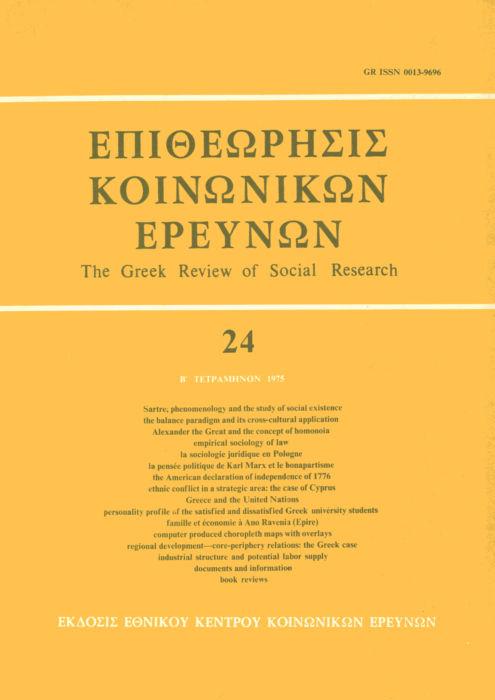Absence as lived in the village daily life between the faraway and the past: (An essay on the situation of Ano Ravenia, village in Epirus)
Abstract
Ano Ravenia is a 600m altitude mountain village in Epirus: one hun
dred and seventy inhabitants in 1978, nine school-children, cattle-
breeding is the main income source but most old people (fifty are
beyond 65l live from pensions and from money sent by those who
have left. What is then really a deserted village?
We could simply consider it as a mere reduced copy of yesterday's
lively village: less inhabitants, older ones, reduced output and
economic activity, empty or dilapidated houses. But, beyond these
demographic changes which necessarily entail economic changes—
both quantitative (in the output volume) and qualitative (in the
nature of the activities)—it is the whole balance of the village com
munity which is at stake along with the very meaning ofits life (or its
survival).
Because, gradually, today's daily life finds its identity only through
a nostalgic reference to a finished past and its meaning in relation to a
faraway where its dynamic forces are now living.
Such a situation becomes evident during festivity periods which
temporarily bring back those who have left. For the village these are
privileged, lively and happy times: though very short, they are much
more important than its daily life. The village therefore is gradually
substituting to its own life another life alloted by the immigrants. The
villagers see themselves through their eyes. This new equilibrium
might be altered by the budding interest city-dwellers have in their
roots, an interest prompting them to purchase lots, build houses to
withdraw to for short periods and possibly to retire in.
Nobody can yet foresee the specificity of this new village where the
importance of temporary, younger and richer residents will be grow
ing. But it will be another village.
Article Details
- How to Cite
-
Piault, C. (1981). Absence as lived in the village daily life between the faraway and the past: (An essay on the situation of Ano Ravenia, village in Epirus). The Greek Review of Social Research, 245–256. https://doi.org/10.12681/grsr.580
- Issue
- 1981: Numero Special
- Section
- Articles

This work is licensed under a Creative Commons Attribution-NonCommercial 4.0 International License.
Authors who publish with this journal agree to the following terms:
- Authors retain copyright and grant the journal right of first publication with the work simultaneously licensed under a Creative Commons Attribution Non-Commercial License that allows others to share the work with an acknowledgement of the work's authorship and initial publication in this journal.
- Authors are able to enter into separate, additional contractual arrangements for the non-exclusive distribution of the journal's published version of the work (e.g. post it to an institutional repository or publish it in a book), with an acknowledgement of its initial publication in this journal.
- Authors are permitted and encouraged to post their work online (preferably in institutional repositories or on their website) prior to and during the submission process, as it can lead to productive exchanges, as well as earlier and greater citation of published work (See The Effect of Open Access).




